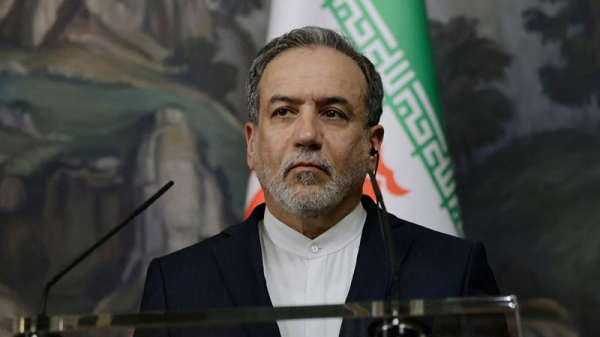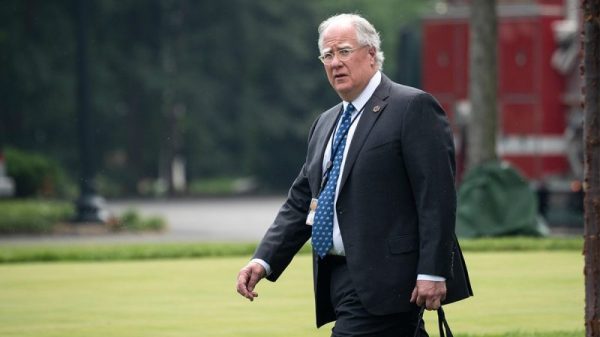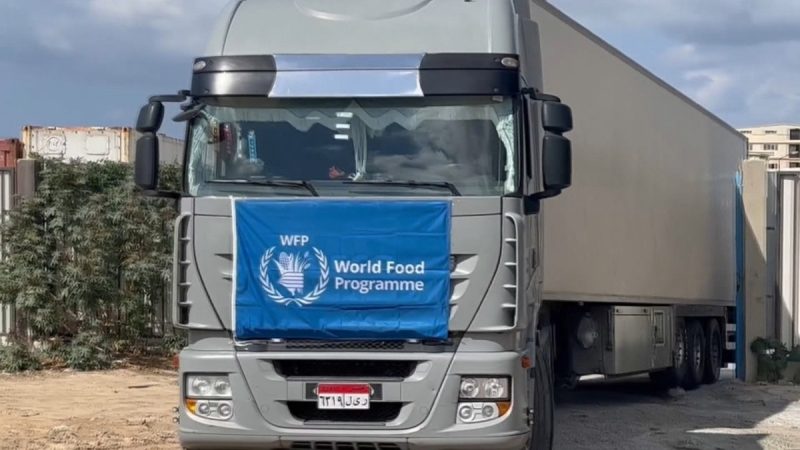JERUSALEM – The head of the Israeli army unit, tasked with coordinating the massive international humanitarian aid operation for millions of Gazan civilians caught in the midst of a raging war in their tiny enclave, rejected recent claims that the territory was on the brink of starvation or facing the imminent threat of infectious and noxious diseases.
Col. Moshe Tetro, head of the Coordination and Liaison Administration (CLA) for Gaza, a division of the military body that in peace times facilitates entry permits for hundreds of thousands of Palestinians civilians and laborers and oversees Palestinian imports and exports to Israel and beyond, told Fox News Digital that while he was familiar with reports claiming the territory was on the brink of starvation, at the moment, ‘there are no restrictions on food going into Gaza.’
Speaking on Friday for the first time in nearly a month, President Biden and Israeli Prime Minister Benjamin Netanayahu discussed the ongoing situation in Gaza. According to a readout of the call provided by the White House, ‘The President and the Prime Minister reviewed the situation in Gaza and the shift to targeted operations that will enable the flow of increasing amounts of humanitarian assistance while keeping the military pressure on Hamas and its leaders.’
Tetro, whose team of soldiers works around the clock to ensure that hundreds of aid trucks, drinking water and fuel enter the Palestinian enclave daily – and work to facilitate the hazardous journey through the Strip – said it was essential to look at the data. Before the war, he said, only 70 trucks of food entered Gaza each day. He said that number has now more than doubled to 220 trucks of food entering daily over the past week.
‘If you open Telegram and other social media pages, take a look at the marketplace in Rafah last Friday – you will see that while many things are missing, there is no shortage of food,’ he said, referring to Gaza’s southernmost town where hundreds of thousands of Palestinian civilians have sought shelter from the fighting.
‘I recommend to anyone writing about this to base their words on the facts and not on the basis of political agendas,’ Tetro said.
‘Our figures come from the United Nations Office for the Coordination of Humanitarian Affairs (OCHA,)’ said a spokesperson for the State Department. The spokesperson also noted that Blinken met with the U.N. Secretary General in Davos and spoke with the ‘U.N.’s newly appointed Senior Humanitarian and Reconstruction Coordinator for Gaza, Sigrid Kaag underscoring the importance of strengthening the humanitarian assistance coordination mechanism in Gaza and facilitating assistance to the northern part of the Gaza Strip.’
Last week the heads of the World Food Programme (WFP), UNICEF and the World Health Organization issued a joint press release calling on Israel to allow more aid into the Gaza Strip as ‘the entire population of Gaza – roughly 2.2 million people – are in crisis or worse levels of acute food insecurity.’
‘Virtually all Palestinians in Gaza are skipping meals every day while many adults go hungry so children can eat,’ said the statement, citing the latest Integrated Food Security and Nutrition Phase Classification report. The report has warned of famine if current conditions in Gaza persist.
‘People in Gaza risk dying of hunger just miles from trucks filled with food. Every hour lost puts countless lives at risk. We can keep famine at bay but only if we can deliver sufficient supplies and have safe access to everyone in need, wherever they are,’ WFP Executive Director Cindy McCain said in the statement, which made an urgent appeal for Israel to open additional crossing points, as well as its nearby port in Ashdod, so more aid being sent from around the world could be received.
Currently, most of the aid – mainly from Arab and Muslim countries such as Egypt, Saudi Arabia, the United Arab Emirates, Qatar and Turkey – arrives at the smaller Egyptian port of al-Arish in northern Sinai. From there, it is transported to two stations on the border with Israel, where soldiers from Tetro’s unit check the shipments for weapons and ammunition that may be smuggled to Hamas terrorists inside the Strip.
Following a thorough security inspection, the trucks, which include food, medicine, and essential supplies such as blankets and tents, enter Gaza either through the Kerem Shalom Crossing from Israel or at the Rafah Crossing from Egypt. International aid agencies and local Palestinian organizations then distribute the goods among the needy across the war-stricken territory. Israel has also agreed to aid shipments of flour to its port in Ashdod.
A spokesperson for Coordinator of Government Activities in the Territories, the military body that oversees the CLA Gaza, pointed out that Israel had already opened an additional checkpoint and another aid entry point at the Kerem Shalom crossing and increased its inspection capabilities in recent weeks.
‘We are checking more trucks than the U.N. is able to accommodate in Gaza,’ the spokesperson said.
According to the latest figures published by the United Nations Office for the Coordination of Humanitarian Affairs (OCHA) – based on information from the Hamas-run Health Ministry in Gaza – more than 1.9 million people, or nearly 85% of the Strip’s population, are internally displaced. The majority of those seeking refuge are sheltering in facilities run by UNRWA, the U.N. agency responsible for Palestinian refugees, OCHA said.
At a recent meeting of the U.N. Security Council, Martin Griffiths, the U.N.’s under-secretary-general for humanitarian affairs and emergency relief coordinator, called the situation in Gaza ‘horrific,’ highlighting what he said were ‘the appalling conditions on the ground.’
‘Shelters are overflowing, and food and water running out, and the risk of famine is growing by the day,’ he said. ‘The health system is in a state of collapse: women are unable to give birth safely; children cannot get vaccinated; the sick and injured cannot get treatment; and infectious diseases are on the rise.’
Last week, U.N. Secretary General Antonio Guterres echoed the same sentiments saying, ‘the long shadow of starvation is stalking the people of Gaza – along with disease, malnutrition and other health threats.’
At the Coordination and Liaison Administration for Gaza unit headquarters, where Israeli soldiers monitor news and social media reports coming out of Gaza 24 hours a day, speak to their local contacts on the ground and coordinate humanitarian aid efforts with international organizations, including the U.N., Col. Tetro said that he was not surprised by such comments.
‘We know these agencies systematically lie and use false narratives, but we are in close contact with international and Palestinian officials in order to assess the civil situation in the Gaza Strip,’ he said, reiterating that there is no shortage of food or water inside Gaza.
Tetro also refuted claims that infectious diseases were on the rise. If that’s true, he said, ‘then why do those diseases not exist? None of the data we have, including that from the international agencies, has identified any outbreaks of diseases.’
‘I’m not saying the situation in Gaza is pleasant,’ said Tetro, who recently authorized additional vaccines for hospitals in case of potential outbreaks. ‘But there is a great distance between the truth and the lies and propaganda that sadly, the international community and also the media promotes, repeating the narrative of a barbaric terror organization without even checking the facts.’
On Monday, COGAT announced that the 10,000th aid truck had arrived in Gaza since the start of the war with Hamas. The statement noted that ‘close to 99% of the coordinated trucks were approved for entry.’







































